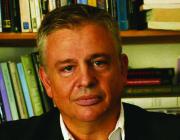in Viadrina Center B/ORDERS IN MOTION
- Prof. Dr. Dagmara Jajeśniak-Quast, Zentrum für Interdisziplinäre Polenstudien, EUV (jajesniak-quast@europa-uni.de)
- Prof. Dr. Aristotle Tympas, National and Kapodistrian University of Athens
- Prof. Dr. Klaus Weber, Lehrstuhl für Wirtschafts- und Sozialgeschichte, EUV (weber@europa-uni.de)
- Dr. Norbert Cyrus (cyrus@europa-universität.de)
- Falk Flade, M.A. (flade@europa-uni.de)
Duration: January 2017 -December 2018
Object of research
Our research group aims at establishing research projects that explore processes of arrangements and re-arrangements in the field of migration and work with special regard to the influence of technology. It produces critical knowledge on concomitant tensions, especially in connection with the relationship between borders and orders. The project identifies and interprets developments in the field of migration and work, which are questioning long-established social routines, challenging European orders. Historically, Europe has been facing similar challenges before. All the relevant (re-)arrangements came with ground-breaking transformations (modern nation states, urban infrastructure, welfare systems) and violence on an unprecedented scale. The nature and scale of the tensions today (social inequality within, migration from outside, environmental strain) remind of those which accompanied the Industrial Revolution and the National Revolutions of the 19th century. It seems impossible that they will be solved with the instruments at hand, simply by adapting and fine-tuning existing policy frameworks. Scrutinizing arrangements and re-arrangements, which have been accepted in the past, will help to identify and to examine the fracture zones in present day orders.
Theoretical approach
The concept of ‘technology’, in itself ambiguous with regard to its socio-economic impact, embraces material (hard) and social (soft) formations (Hughes/Mayntz 1988; Tympas 2015). The concept occurred in the early 20th century, alongside the culmination of industrialization in Fordist arrangements of factory work, and the concurrent emergence of mass societies, welfare systems, transformation of family structures, etc. (Kohlrausch/Trischler 2014; Kaiser/Schot 2014). To avoid technological determinism, which is the idea that technology is the main driver for societal and cultural developments, the approach is enriched with the concept of ‘arrangement’, which consciously plays on the ambiguity of the term, implying the meaning of order and of agreement. It raises awareness that order – as an effect of border demarcation processes – is often misconceived as a uni-directional top-down imposition (conceived as a static arrangement). In fact, it always involves some degree of bottom-up acceptance. In this view, orders are conceived as arrangements resulting from power struggles between actors who are guided by their respective values and interests. Stability or fragility of an order rests on the degree at which relevant actors come to terms with an order, at least in form of a latent acceptance. A precarious stability of arrangements is achieved by everyday cooperation. They remain stable, if actors accept a situation-specific and arena-specific order, which nonetheless can be characterized by tensions and contradictions. Arrangements need to be understood as compromises, thus open to immanent critique. The application and adaptation of the two concepts of technology and (re-)arrangements is called “Technology-Arrangement-Nexus” and can provide new relevant insights in the field of migration and work. In doing so, the project aims at contributing to overcome at least some of the existing challenges, Europe is facing today.
Additional Websites:
Prof. Dr. Dagmara Jajeśniak-Quast, Center for Interdisciplinary Polish Studies, European University Viadrina
Prof. Dr. Aristotle Tympas, National and Kapodistrian University of Athens
Prof. Dr. Klaus Weber, Lehrstuhl für Wirtschafts- und Sozialgeschichte, Europa-Universität Viadrina

